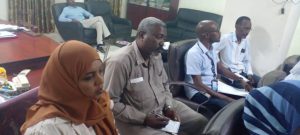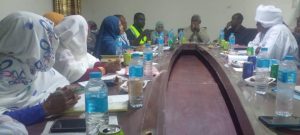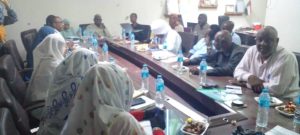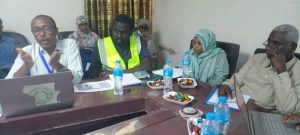



Al-Damer – Mohammed Fadlallah Shashoq
Mr. Ahmed Hamid Ahmed Yis, Director-General of the Ministry of Education in River Nile State and Acting Minister, chaired a meeting at his office in Al-Damer. The meeting included several directors of general and specialized departments within the ministry, with the attendance of Ms. Afaf Taj Elsir, the State Commissioner for Humanitarian Aid, alongside representatives from UNICEF, Al-Auttash Organization for Peace and Development, and Nabta Charity Organization for Development.
The meeting aimed to prepare for the launch of the project titled:
“Increasing and Enhancing Safe Access to Child-Friendly Education Opportunities through Psychosocial Support Programs and Skills Development for School-Age Children Affected by the War and Residing in River Nile State.”
The project is funded by the UNICEF Education Section – River Nile Office and will be implemented in 181 schools across the localities of Al-Damer, Atbara, and Shendi, with an estimated budget of $1,086,182 USD.
The project involves several key stakeholders including Al-Auttash Organization for Peace and Development, the Ministry of Education, the Humanitarian Aid Commission, the Ministry of Social Affairs, and Nabta Charity Organization for Development.
Roles and responsibilities of the participating parties were defined during the meeting. The initiative aims to improve the school environment through the distribution of educational materials, maintenance and renovation of classrooms and restrooms, and support the academic year’s stability by increasing the enrollment of war-affected children. This includes the establishment of alternative education centers, awareness campaigns, and community mobilization in Al-Damer, Atbara, and Shendi.
The project also focuses on:
Training trainers in curriculum education
Training teachers on school development planning
Conducting training packages for facilitators in mental health and psychosocial support
Establishing children’s clubs
Contributing to the overall strengthening of the education sector in the state
The implementation period is one year, running from February 2024 to February 2025.
Mr. Ahmed Hamid Ahmed Yis, Director-General and Acting Minister, praised the substantial and continuous support provided by international and national organizations to the education sector, which has contributed to stabilizing education in the state despite the exceptional circumstances in the country.
He emphasized that River Nile State is currently prioritizing educational opportunities for displaced students arriving from war-affected states. The state has also taken the responsibility of hosting external examination centers for both primary and intermediate certificates.
He called on UNICEF, the Humanitarian Aid Commission, and other organizations to consider the observations and suggestions raised by educational departments, as they are the most specialized entities in identifying the actual needs in each area of the project. He affirmed the ministry’s full cooperation with organizations to ensure the optimal implementation of proposed projects.
Ms. Afaf Taj Elsir, Commissioner for Humanitarian Aid in River Nile State, stressed the importance of flexibility from organizations during implementation and the need to rely on professional input to identify actual needs — prioritizing quality over quantity to ensure tangible and impactful results.
Representatives from UNICEF, Al-Auttash Organization for Peace and Development, and Nabta Charity Organization for Development welcomed the feedback from educational leaders. They stated that the project includes the creation of safe spaces offering various activities and life skills, along with basic educational content, to help improve the psychological well-being of children affected by the war.
Additionally, education department directors presented several proposals, including the inclusion of other localities in the project, a reduction in the number of schools, and a focus on program quality and effectiveness.
The organizations clarified that the selection of the localities — Al-Damer, Atbara, and Shendi — was based on initial reports identifying these areas as having the highest influx of displaced persons from war-affected states.
They also promised to consider expanding the project to include other localities in the future.
Written by: Media Office – Ministry of Education, River Nile State
